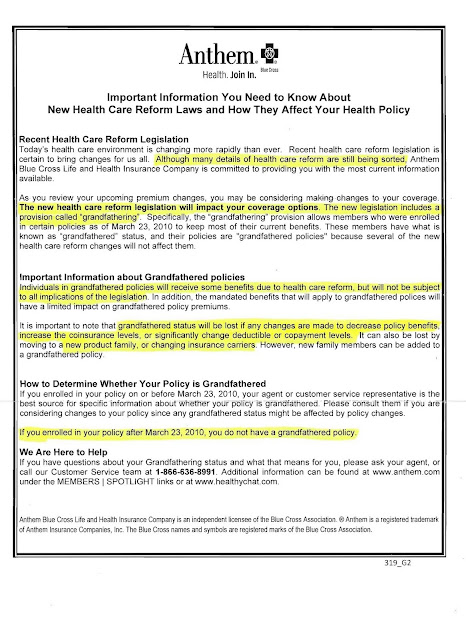STOP WHINING! Part I.
STOP WHINING! is a new segment dedicated to the refutation (and occasional mockery) of needless whining. Just ask Arnold.
Most reporters do a poor job of covering court decisions. They tend to regard the courts as a public policy creator on par with the executive and legislature, rather than as an interpreter of the other branches' laws. This leads them to focus on political ramifications, rather than the substance of the interpretation itself.
Case in point:
AP writer Jesse J. Holland's opinionated lamentation—thinly disguised as a news article—of the Supreme Court's recent Miranda-related holdings.
For context, the "Miranda rights" (to remain silent and request an attorney) are mandated by the Supreme Court's holding in
Miranda v. Arizona, based upon an expansive reading of the Fifth Amendment's right for an individual to not "be compelled in any criminal case to be a witness against himself."
The headline itself declares Holland's personal bias: "High court trims Miranda warning rights bit by bit." This incendiary language is entirely inappropriate. First, the Supreme Court may only interpret—rather than create—our rights under the law, so these holdings do not "trim" our rights; they just signify that the Court previously erred in deciding that certain rights existed in the first place.
Second, regardless of Holland's opinion, it is poor form for a journalist to conspicuously inject his own bias into a news piece; that's why our newspapers are divided between "news" and "opinion" sections. I learned that basic lesson during high school journalism.
Substantively, the author's sarcastic, indignant tone demonstrates his ignorance of opposing viewpoints just as strong as his contempt for those who hold them.
The lead sentence previews one of his critical themes: "You have the right to remain silent, but only if you tell the police that you're remaining silent."
Clever.
He later elaborates that "the court's conservatives used their 5-4 advantage to rule that suspects must break their silence and tell police they are going to remain quiet if they want to invoke their 'right to remain silent' and stop an interrogation, just as they must tell police that they want a lawyer."
In other words, the police must cease an interrogation once a suspect signals a desire to speak to an attorney. Until then, the police may continue asking questions. Holland's indignation is odd, since this "new" rule just spells out a premise that any law student studying
Miranda assumes to be true.
After all, it's pretty humorous to imagine a police interrogation under the author's apparently preferred rule that police must stop interrogating a suspect who does not request an attorney, but simply doesn't speak:
Detective: So, we caught you covered in the victim's blood, while clutching a bloody knife in a stabbing posture, and hovering over the victim's corpse. What do you have to say for yourself?
Suspect: ...
Detective: OH! You didn't respond to my question, so the Fifth Amendment
obviously compels me to stop asking you questions! Forget that there are a thousand reasons you may not have answered me completely independent of your right to remain silent. The last thing society wants is for me to offend your delicate sensibilities by repeatedly talking until you admit that you just killed someone. After all, I just might bore you into uttering a false confession!
Me: This is preposterous! I as a libertarian believe that the primary purpose of law is to protect us from other persons, and from the state. This means the state certainly cannot compel us to confess against our will; this is the United States, not the Spanish Inquisition. But the law certainly does not prevent law enforcement officers from using reasonable means of securing honest, willful confessions from criminal suspects.
More importantly, why do we want the law to protect a suspect who honestly confesses to a crime absent illegitimate coercion?
Justice Antonin Scalia once quipped in a dissenting opinion:
Nonthreatening attempts to persuade the suspect to reconsider that initial decision are not, without more, enough to render a change of heart the product of anything other than the suspect’s free will. Thus, what is most remarkable about the Miranda decision ... is its palpable hostility toward the act of confession per se, rather than toward what the Constitution abhors, compelled confession. The Constitution is not, unlike the Miranda majority, offended by a criminal’s commendable qualm of conscience or fortunate fit of stupidity. Dickerson v. United States, 530 U.S. 428 (2000) (Scalia, J., dissenting).
Indeed.
I'm sure Holland's heart is in the right place—preserving our civil liberties. Hopefully, Holland can see that the battle for the individual right against coerced confessions was won years ago—seeing as how we're squabbling over whether a suspect must burden himself by vocalizing his desire to remain silent, rather than sit in the interrogation room like a bump on a log.
Perhaps, then, Holland and other reporters will re-channel their energy and champion individuals whose property is seized in large quantities and redistributed to other individuals by the government.
OK, a blogger can dream, can't he?















